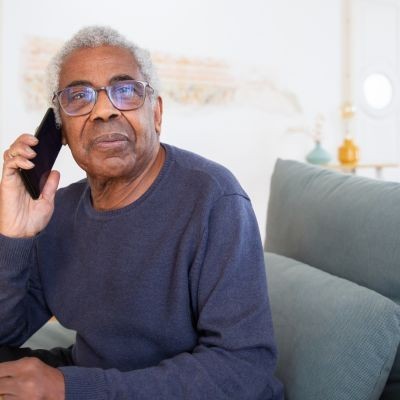
Head of Online Medical Content

Audiology Expert at Hearing Aid UK

Hearing Aids for the Deaf Community
Can a profoundly deaf person hear with hearing aids?
Overview | Environmental awareness | How do hearing aids help those who are deaf? | Understanding the levels of hearing loss | Cochlear implants | Conclusion
Profoundly deaf aids - Discovering how a deaf person can hear with a hearing aid
Digital hearing aids are made of small computers and microphones that are mainly designed to amplify and increase awareness of sounds in your listening environment. But what if you have severe hearing loss or are profoundly deaf? One of the main questions surrounding this is usually, "Can hearing aids allow a deaf person to hear better?"
There are various technologies and hearing devices for the deaf. For example, cochlear implants, visual alert systems, FM systems, loop systems, accessible telephones and videophones. Plus, you'd be surprised to know that digital hearing aids can really help deaf people's understanding of the world around them.
Hearing aids for the profoundly deaf - Environmental awareness
Digital hearing aids successfully increase the volume of the sounds you hear. There is a large percentage of people who are deaf who still retain some level of hearing and therefore, hearing aids can be effective. Increasing awareness of both speech and sound in their own unique environment.
However, how the brain uses this sound varies depending on what hearing aid and power they are using. Some people who wear powerful 'deaf aids' do so to take advantage of amplified speech sounds. When combined with lip-reading and sign language - they gain higher environmental awareness.
Hearing aids for the deaf in one ear
People who have one ear that is deaf are commonly referred to as those who have 'single-sided deafness'. This means you have one ear that is deaf and one ear with ‘normal’ hearing. This also applies to those who have one deaf ear and one who has hearing loss which can be improved by wearing a digital hearing aid.
How do hearing aids help deaf people?
Real-life question: "In instances of irreversible hearing loss due to factors like loud noise exposure or ageing, how do hearing aids aid those considered deaf and struggling to comprehend everyday conversations?"
Our response: "You're correct that hearing aids are ineffective when there's no residual hearing, akin to a blind person wearing spectacles. While many hearing losses are permanent, solutions exist for those with limited hearing. Strategies include lip-reading courses, sign language, specialised home accessories, and even assistance from hearing dogs.
We offer resources for those considering hearing aids and facilitate initial hearing tests. If no hearing is detected, our hearing aid audiologists connect those with local support organisations for further assistance".

Hearing Devices for the Deaf
Understanding the difference between hearing loss and profound deafness
Levels of hearing loss
When you have hearing loss you probably hear some sounds, but not all available sounds. Hearing loss is divided into several categories or levels. These are: mild, moderate, severe, and profound.
When you are profoundly deaf it means you have the most profound hearing loss, which reduces your soundscape dramatically - even loud sounds within a short distance can be hard to distinguish.
Benefits of hearing aids for a deaf person
Every hearing aid is different and can benefit different levels of hearing loss, therefore not all hearing aid devices can cater to those who are profoundly deaf. The most popular hearing aids for the deaf are ones that can personalise the levels of sound according to various listening environments.
It is important to remember that those who are profoundly deaf might not be ideal candidates for hearing aids, as some people might get more support from a cochlear implant.
However, many people who are deaf prefer to wear hearing aids and hard-of-hearing devices for the deaf to personalise their listening experience more or for that extra boost - depending on their surroundings.
Combining ENT and a hearing care professional or audiologist
In some cases, the profoundly deaf community often benefits from a combination of an ENT specialist and a local audiologist to ensure optimum hearing healthcare. Because they don't slot into established processes of care, like those with mild to moderate hearing loss, adding gain is not enough.
Those who are deaf are highly reliant on technology combined with sign language - their communication challenges are often too great for just a hearing aid alone. A treatment program that incorporates audiology management options like counselling, sign language, hearing assistant devices or hearing aid accessories and more is historically successful.
Cochlear implants are another hearing solution for the profoundly deaf
Cochlear implants are devices that are surgically implanted in the inner ear (cochlea) to help people who have severe hearing loss or are deaf to hear. They are designed for individuals who do not benefit from hearing aids or other assistive listening devices.
The implant consists of two main parts: an external processor and an internal device that is surgically implanted in the ear. The external processor is worn behind the ear and is connected to a microphone that picks up sound from the environment.
The processor converts the sound into digital signals and sends them to the internal device, which is a small electronic device that is surgically implanted in the cochlea. The internal device consists of an array of electrodes that stimulate the auditory nerve and enable the person to hear.
Cochlear implants can help people with severe hearing loss or deafness to hear and understand speech and to participate in conversations, listen to music, and hear other sounds in their environment.
They are not a replacement for natural hearing and do not restore normal hearing. However, they can significantly improve their ability to hear and understand speech and participate in daily activities.
Cochlear implants are generally safe and effective. However, like any surgical procedure, they do carry some risks, such as infection and bleeding. It is important to discuss the potential risks and benefits with a qualified healthcare provider before deciding whether a cochlear implant is right for you.
Why Choose Us?
- FREE Hearing Tests
- Best Hearing Aids and Prices
- FREE Aftercare for Life
- FREE Home Visits
- 200+ Local Audiologists
- 60 Day Money Back Guarantee
Need more support with hearing aids for the profoundly deaf?
We can help you locally
Despite limitations in addressing complete deafness, hearing aids significantly enhance the quality of life for those with profound hearing loss. Using advanced technology, modern hearing aids amplify sound and facilitate clearer communication, offering better social engagement and emotional well-being.
If you would like more information regarding hearing aids for the profoundly deaf or if you have any other hearing healthcare enquiries - call us free on 0800 567 7621
Hearing aid advice articles you might like...
 Straining to Hear Conversations – Do I Have Hearing Loss?
Straining to Hear Conversations – Do I Have Hearing Loss?  I have trouble hearing on the phone, do I have hearing loss?
I have trouble hearing on the phone, do I have hearing loss?  I Keep Turning Up the Volume on the TV – Do I Have Hearing Loss?
I Keep Turning Up the Volume on the TV – Do I Have Hearing Loss? What's included in our hearing aid prices?
Our specialist service includes:
Do not spend hundreds of pounds without getting a second opinion from us.
Please call us on 0800 567 7621
 Not only are the prices great, but the service is fantastic! Many thanks to your team.
Not only are the prices great, but the service is fantastic! Many thanks to your team.Common FAQs when researching hearing aids and hearing loss
If you are looking at this page then it is likely that an audiologist has suggested that you purchase this particular hearing aid, so is this the best model for you?
In general, any audiologist will always recommend to you the model that best suits your needs. Here is a useful checklist to make sure that is the case.
- Audiologist level of knowledge: The audiologist you have seen will hopefully have a wide knowledge of all available hearing aids, however, some will only be familiar with a small number of brands and therefore may not really be in a position to know which model is the best for you. It is OK to challenge their recommendation and ask them to justify why this particular brand is the one for you.
- Do research: Read about the hearing aid that was recommended. Does it seem like it will suit your lifestyle? Does it have more or fewer features than you need?
- Be aware of sales targets: Many high street retailers have specific tie-ins to a particular manufacturer/brand. The hearing aid they have suggested may still be the correct one for you, but do your research so that you know why they might have recommended it.
If in doubt, feel free to give us a call. That's what we're here for. In the meantime, read all about our review of the best hearing aids for 2025 here
If you have significant hearing loss in both ears, you should be wearing two hearing aids. Here are the audiological reasons why:
Localisation: The brain decodes information from both ears and compares and contrasts them. By analysing the minuscule time delays as well as the difference in the loudness of each sound reaching the ears, the person is able to accurately locate a sound source. Simply put, if you have better hearing on one side than the other, you can't accurately tell what direction sounds are coming from.
Less amplification is required: A phenomenon known as “binaural summation” means that the hearing aids can be set at a lower and more natural volume setting than if you wore only one hearing aid.
Head shadow effect: High frequencies, the part of your hearing that gives clarity and meaning to speech sounds, cannot bend around your head. Only low frequencies can. Therefore if someone is talking on your unaided side you are likely to hear that they are speaking, but be unable to tell what they have said.
Noise reduction: The brain has its own built-in noise reduction which is only really effective when it is receiving information from both ears. If only one ear is aided, even with the best hearing aid in the world, it will be difficult for you to hear in background noise as your brain is trying to retain all of the sounds (including background noise) rather than filtering it out.
Sound quality: We are designed to hear in stereo. Only hearing from one side sounds a lot less natural to us.
Fancy some further reading on this topic? You can read about why two hearing aids are better than one in our article, hearing aids for both ears, here
For most people, the main benefit of a rechargeable hearing aid is simple convenience. We are used to plugging in our phones and other devices overnight for them to charge up. Here are some other pros and cons:
For anybody with poor dexterity or issues with their fingers, having a rechargeable aid makes a huge difference as normal hearing aid batteries are quite small and some people find them fiddly to change.
One downside is that if you forget to charge your hearing aid, then it is a problem that can't be instantly fixed. For most a 30-minute charge will get you at least two or three hours of hearing, but if you are the type of person who is likely to forget to plug them in regularly then you're probably better off with standard batteries.
Rechargeable aids are also a little bit bigger and are only available in Behind the Ear models.
Finally, just like with a mobile phone, the amount of charge you get on day one is not going to be the same as you get a few years down the line. Be sure to ask what the policy is with the manufacturer warranty when it comes to replacing the battery.
Looking for more information on rechargeable hearing aids? Read our dedicated page on the topic here
For most people, the answer is yes. But it's never that simple.
The majority of hearing problems affect the high frequencies a lot more than the low ones. Therefore open fitting hearing aids sound a lot more natural and ones that block your ears up can make your own voice sound like you are talking with your head in a bucket. Therefore in-ear aids tend to be less natural.
However the true answer is we can't tell until we have had a look in your ears to assess the size of your ear canal, and until we have tested your hearing to see which frequencies are being affected.
People with wider ear canals tend to have more flexibility, also there are open fitting modular CIC hearing aids now that do not block your ears.
There is also the age old rule to consider, that a hearing aid will not help you if it's sat in the drawer gathering dust. If the only hearing aid you would be happy wearing is one that people can't see, then that's what you should get.
Most people can adapt to any type of hearing aid, as long as they know what to expect. Have an honest conversation with your audiologist as to what your needs are.
Generally speaking, six or more. Unless it's none at all.
The number of channels a hearing aid has is often a simplistic way an audiologist will use to explain why one hearing aid is better than another, but channels are complex and it is really not that straightforward. Here are some reasons why:
Hearing aids amplify sounds of different frequencies by different amounts. Most people have lost more high frequencies than low and therefore need more amplification in the high frequencies. The range of sounds you hear are split into frequency bands or channels and the hearing aids are set to provide the right amount of hearing at each frequency level.
Less than six channels and this cannot be done with much accuracy, so six is the magic number. However, a six channel aid is typically very basic with few other features and is suitable only for hearing a single speaker in a quiet room. The number of channels is not what you should be looking at, it's more the rest of the technology that comes with them.
As a final note, different manufacturers have different approaches. One method is not necessarily better than any other. For example, some manufacturers have as many as 64 channels in their top aids. Most tend to have between 17 and 20. One manufacturer has no channels at all.
Hearing aids are easily lost, misplaced or damaged and typically are one of the most expensive personal possessions an individual can own. We offer hearing aid warranty coverage for £80 per year per aid. Find out more about this service we provide here
All our audiologists use the very latest technology and provide the full range of tests to accurately measure your hearing for free. Find out about what hearing healthcare services we offer all our customers here
Hearing Aid UK offers all their customers free home visiting services, even in a care home environment, for no extra cost. Including hearing tests, fittings, maintenance, check-ups and much more in the comfort of your own home and at your convenience. Find out more information about our home visits here
Here, at Hearing Aid UK, we are dedicated to offering low hearing aid prices. We achieve this by having no head office and low marketing costs. Our hearing aid prices are amongst the lowest you will find anywhere in the world. Explore our prices, brands, and models here
Other pages you might find useful
Ask the Experts
6 Morton Lane
Walkwood
Redditch
Worcestershire
B97 5QA
Latest Launch
When we refer to a product as 'Latest Launch', we mean it is the latest to be released on the market.
New
When we refer to a product as 'New', we mean that the product is the newest hearing aid model on the market.
When we refer to a product as 'Superseded', we mean that there is a newer range available which replaces and improves on this product.
Older Model
When we refer to a product as an 'Older Model', we mean that it is has been superseded by at least two more recent hearing aid ranges.
